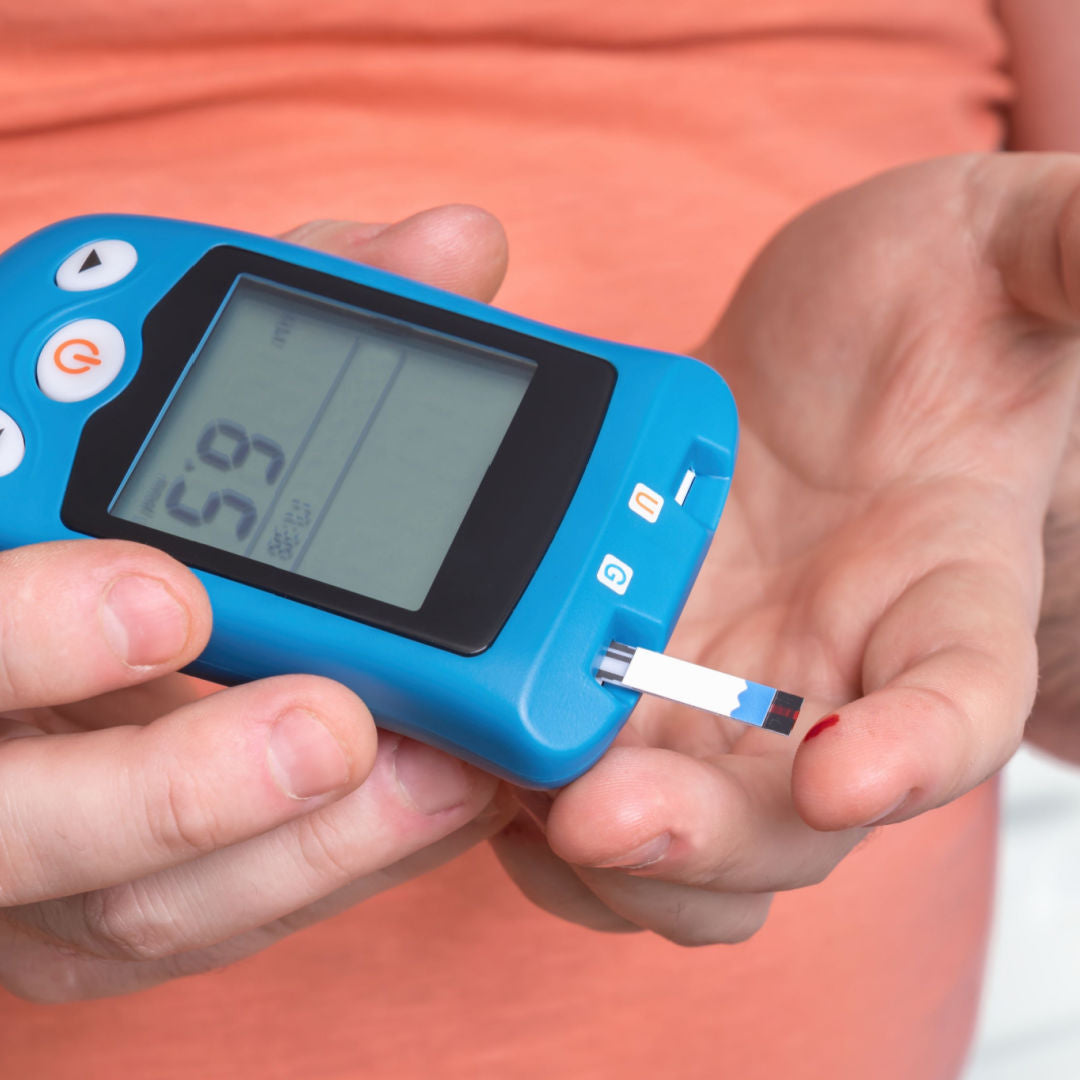
What can be causing your blood sugar to spike?
Share
For those living with diabetes, keeping blood sugar levels under control is a constant concern.
Even following the treatment indicated by the doctor, some factors can cause fluctuations or spikes in blood sugar levels. Read on to learn more about it.
Common causes of blood sugar spikes
Food Choices
If you live with diabetes, watching what you eat is critical to keep sugar levels under control. There’s no one-size-fits-all diet for everyone with diabetes, but following general healthy eating, rules can help.1
Food rich in carbs, such as rice, pasta, white bread, and highly processed or fried foods, can raise blood sugar levels. So it’s best to eat them in moderation.
The same rule applies to fruits high in sugar, such as bananas.1
Choose healthier sources of carbohydrates such as whole grains, fruits, vegetables, and pulses, and be aware of portion sizes.1
Another tip is to cut down on added sugar. Swap sugary drinks and fruit juices for water, tea, or coffee without sugar.1
Lastly, choose yogurts, seeds, fruits, and vegetables instead of chips and chocolates for snacks.1
Time of Day
Blood sugar levels are highest in the morning when cortisol and growth hormone stimulates the liver to produce glucose (sugar). This triggers beta cells in the pâncreas to release insulin to keep glucose levels under control.2
But people with diabetes don’t produce enough insulin to do this job, and blood sugar levels may elevate in the morning. This is called the Dawn effect.2
Lack of Sleep
One night of sleep deprivation is enough to increase insulin resistance, which can increase blood sugar levels. This may explain why lack of sleep is linked with diabetes.3
The mechanisms that may lead to increased glucose levels following sleep deprivation are:3
- Increased cortisol levels
- Reduced insulin sensitivity
- Increased growth hormone levels
- Increased oxidative stress and inflammation
Exercise
Although exercising helps control blood sugar levels, some people may notice a spike in those levels after working out. Heavy lifting, sprints, and competitive sports stimulate the production of stress hormones such as adrenaline, which makes the liver release glucose.4
It's best to avoid eating too many carbs before training to avoid significant increases in blood sugar levels. 4
If you have diabetes, prefer moderate exercise or relaxation techniques to avoid the effects of adrenaline. 4
Moving your workout session to later in the day is also a good idea to avoid the Dawn effect. 4
But keep yourself active, as the lack of physical exercise can contribute to obesity and raised blood sugar levels.
Stress
When you’re under stress, your body releases hormones such as cortisol and adrenaline. These hormones make it harder for insulin to work properly, causing insulin resistance and increased blood sugar levels. If stress persists, it can cause diabetes complications.5
Another factor that can contribute to increased blood glucose levels is emotional eating. So, if you live with this problem, seek professional help. 5
Medications
Insulin can bring blood sugar levels down, but missing a dose can have the opposite effect.6
Additionally, medications can cause adverse events such as raising blood glucose levels and even drug-induced diabetes. Such medications include corticosteroids (anti-inflammatory), thiazide diuretics (treatment for high blood pressure), beta-blockers (to reduce blood pressure), antipsychotics (treatment for mental health conditions), and statins (to help lower LDL-cholesterol levels).6
Other Causes
In addition to the causes mentioned above, other factors can contribute to spikes in blood sugar levels. For example:
- Smoking – nicotine increases blood sugar levels and makes them harder to handle.7
- Dehydration – It makes the sugar more concentrated in the blood due to the lack of water.8
- Gum disease – it’s a complication of diabetes and can make sugar levels spike due to inflammation that makes it harder for the body to keep insulin and blood sugar in check.
- Artificial sweeteners - some studies link their use to increased blood sugar levels, but more data is needed to reach a conclusion.8
- Coffee – Some people may experience a blood sugar spike after consuming coffee, even without sugar or sweetener. 8
- Nose spray – it contains chemicals that may trigger the liver to make more glucose.8
Summary
Several things can cause a person's blood sugar levels to rise, even if they follow the treatment prescribed by their doctor. That's why it's essential to pay attention to healthy habits, such as good sleep, exercising, healthy eating, and taking care of oral and mental health.
References:
- Diabetes UK. 10 tips for healthy eating with diabetes. Available at: https://www.diabetes.org.uk/guide-to-diabetes/enjoy-food/eating-with-diabetes/10-ways-to-eat-well-with-diabetes. Access: 11/01/2022.
- American Diabetes Association. High Morning Blood Sugars. Available at: https://diabetes.org/diabetes/treatment-care/high-morning-blood-glucose. Access: 11/01/2022.
- Sleep Foudation. Sleep and Blood Glucose Levels, 2022. https://www.sleepfoundation.org/physical-health/sleep-and-blood-glucose-levels#:~:text=Decreased%20sleep%20is%20a%20risk,diabetes%2C%20a%20blood%20sugar%20disorder. Access: 11/01/2022.
- American Diabetes Association. Why Does Exercise Sometimes Raise Blood Glucose (Blood Sugar)? https://diabetes.org/healthy-living/fitness/why-does-exercise-sometimes-raise-blood-sugar#:~:text=Adrenaline%20Can%20Raise%20Blood%20Glucose%20(Blood%20Sugar)%20Levels&text=Some%20workouts%2C%20such%20as%20heavy,your%20liver%20to%20release%20glucose. Access: 11/01/2022.
- Diabetes UK. Stress and diabetes. https://www.diabetes.org.uk/guide-to-diabetes/emotions/stress. Access: 11/01/2022.
- co.uk. Drug Induced Diabetes, 2022. https://www.diabetes.co.uk/drug-induced-diabetes.html. Access: 11/01/2022.
- Smoking and diabetes, 2022. Available at: https://www.cdc.gov/diabetes/library/features/smoking-and-diabetes.html#:~:text=Nicotine%20increases%20your%20blood%20sugar,close%20to%20their%20target%20levels. Access: 11/01/2022.
- 10 Surprising Things That Can Spike Your Blood Sugar, 2022. Available at: https://www.cdc.gov/diabetes/library/spotlights/blood-sugar.html#:~:text=For%20people%20with%20diabetes%2C%20blood,to%20make%20more%20blood%20sugar. Access: 11/01/2022.